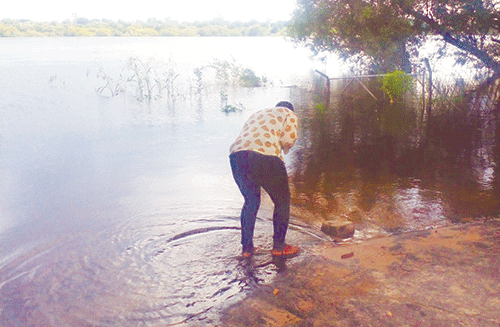KATIMA MULILO - The Zambezi health directorate has alerted Namibians travelling to neighbouring Zambia to take precautionary measures against the cholera outbreak, which continues to claim many lives and leave thousands hospitalised.
Zambia has been battling a cholera outbreak since last October, with 12 719 cases and 498 deaths recorded since then. A total of 11 399 people have been discharged, the Zambian ministry of health was quoted as saying in Zambian media.
Zambezi’s acting health director Yolanda Lisho yesterday gave the assurance that Namibia had no cholera cases recorded over the past two years.
“Zambezi residents are encouraged to implement infection prevention and control measures at all levels such as handwashing or basic hygiene, access to safe water, and adequate sanitation to prevent the spread of or outbreak of cholera, as there is an ongoing outbreak in neighbouring Zambia. To those travelling to Zambia, take precautionary measures to stay safe and protect yourself from cholera,” she cautioned in an interview with New Era.
Cholera is an infection of the small intestine by some strains of the bacterium vibrio cholerae. It is spread mostly by unsafe water and unsafe food that has been contaminated with human faeces containing the bacteria. Under-cooked shellfish is a common source.
Humans are the only known host for the bacteria. Risk factors for the disease include poor sanitation, insufficient clean drinking water and poverty.
The 2023–2024 Zambian cholera outbreak is currently one of the most severe health crises in the country’s recent history, with its origins traced back to January 2023.
The outbreak initially surfaced in the Vubwi district in the eastern district, and the Mwansabombwe district in Luapula province.
By October 2023, the Zambia National Public Health Institute reported a cholera outbreak in the capital, Lusaka.
Lisho reminded those travelling to Zambia to avoid drinking water from unknown sources.
Travellers are also encouraged to practise hand hygiene after visiting the toilet, before and after preparing meals, and before eating.
“Lastly, spread awareness about cholera prevention in your community. Together, we can fight this disease. Remember, knowledge is the first line of defence against cholera,” she stressed.
Possible signs and symptoms of cholera include vomiting, profuse watery diarrhoea, thirst, restlessness and irritability, and leg cramps.
Equally, residents are urged to seek medical attention for early diagnosis and treatment once they experience any of the signs and symptoms to avoid complications of cholera, which can lead to severe dehydration and death. The health ministry in that country declared the cholera outbreak in Zambia in a press conference on 26 January 2023.
On Monday, Xinhua reported that Zambia has received more oral vaccines to stem the cholera outbreak, which has continued to surge.
Zambian Minister of Health Sylvia Masebo said the ministry has received the remaining vaccines from Gavi, the Vaccine Alliance, through the United Nations, bringing the total vaccines to 1.7 million doses.
She said in a statement on the cholera situation that plans are underway to procure additional vaccines from alternative sources to be administered to people in cholera-prone areas.
The minister, however, expressed concern that some sections of society are refusing to take the vaccine, adding that this is unfortunate as vaccines are meant to secure the lives of people. Zambia commenced the administration of the vaccine in five cholera hotspots in the capital Lusaka last week after receiving 1.4 million doses.
About 1.2 million people have received the vaccine so far, representing a 69% coverage.
Meanwhile, the minister said the government is concerned about the number of people dying in communities due to presenting themselves late at health facilities.
“We encourage our people to visit their nearest health post or community health worker as a point to access oral rehydration therapy as they make their way to the centres,” she added.


